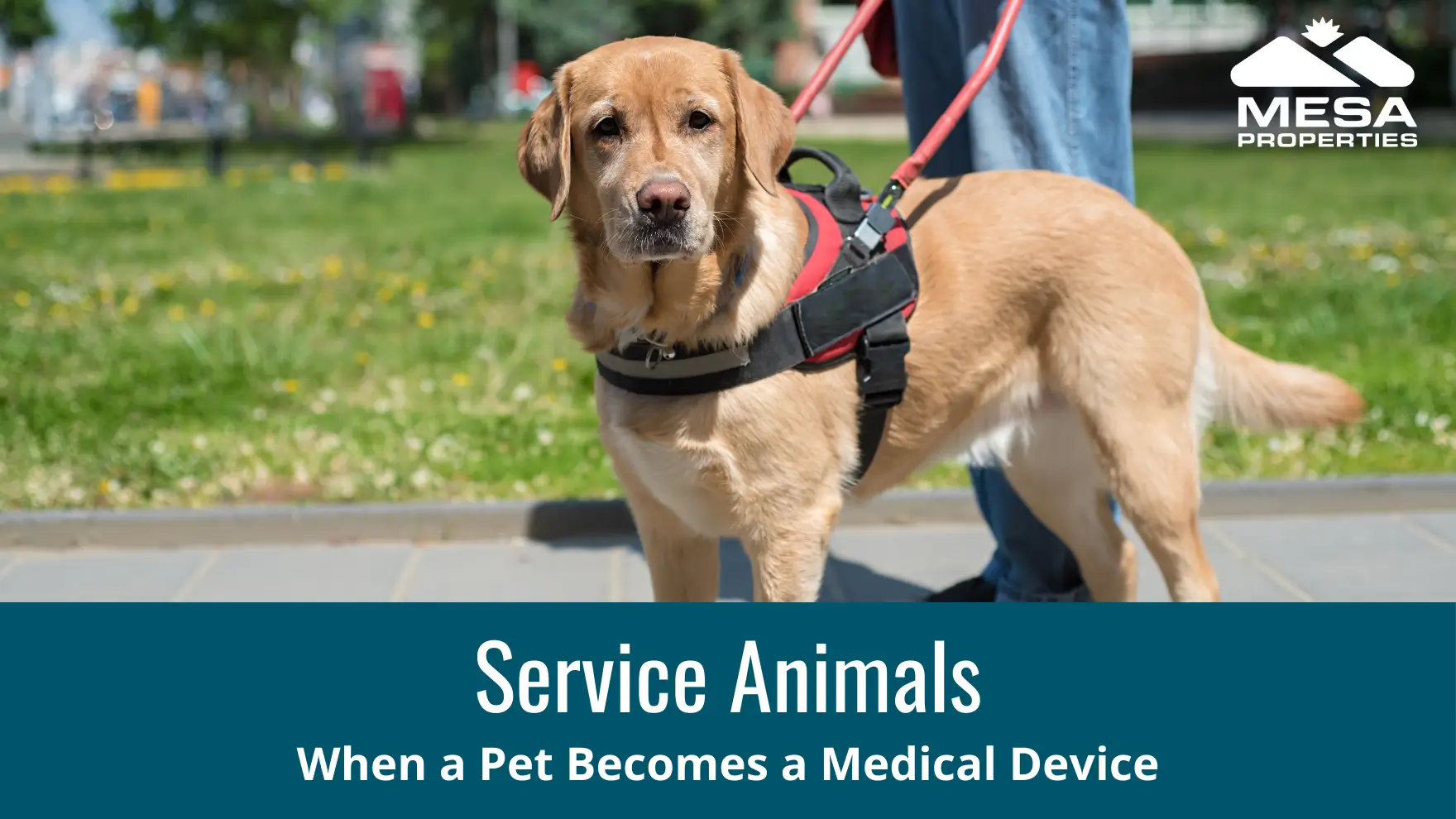Everyone loves a big fluffy Golden Retriever. They're playful, fun, good with kids, and are notorious for damaging rentals. What's not to love?
As an owner of a residential rental property, you have an important question to answer. That question is, "Do I want to allow pets?"
The advantage of allowing pets is that more qualified applicants will apply for your home. You might even be able to decrease the time it takes to find a tenant. The drawback is that by allowing pets into your home, you run the risk of letting in a mischievous dog that will cause severe property damage. The horror stories of dogs destroying homes are everywhere.
To allow pets, or not to allow pets, that is the question.
HUD Doesn't Care What You Decide
The fact of the matter is, sometimes you don't get to make that decision. The Department of Housing and Urban Development, also known as HUD, has officially put service animals in the same class as medical devices.
That's right, a dog is in the same class as a wheelchair. And just as you wouldn't discriminate against someone in a wheelchair, you cannot legally discriminate against someone who uses a service animal.
Service animals are an absolute necessity to those that need them. Congress has estimated that there are hundreds of thousands of legitimate service animals across the United States. These dogs do everything from leading the blind to alerting those with chronic seizures that an incoming attack is about to happen. Ultimately, service animals increase the quality of life for disabled people.
Because of this life changing impact, the government has taken steps to protect those who are legitimately disabled and require service dogs. HUD has applied The Fair Housing Act of 1968 to service dogs by specifically using the rationale that service dogs are necessary medical devices for disabled persons. Keyword "disabled."
The notorious Fair Housing Act is the paramount federal law that prohibits discrimination in the following areas:
Race
Religion
Sex
National Origin
Familial Status
Disability
According to The Department of Housing and Urban Development
"Under these laws, rules, policies, or practices must be modified to permit the use of an assistance animal as a reasonable accommodation in housing when its use may be necessary to afford a person with a disability an equal opportunity to use and enjoy a dwelling and/or the common areas of a dwelling."
Ultimately, denying housing to a person solely because they have a service animal is blatantly illegal and punishable by federal law.
Service Dogs vs. Emotional Support Animals
Service dogs and emotional support animals fall into two different legal categories. A service dog is a dog that has been trained to perform some task such as pulling a wheelchair or leading a blind person down a busy street. By law, a service dog must be trained to do some sort of work. As the law stands right now, dogs are the only type of animal that can be trained to work. Therefore, service dogs must be dogs. There is no such thing as a service bird.
An emotional support animal, also known as an assistance animal, does not have to be a dog. It can be a cat, a bird, or even a miniature horse. Under both Section 504 of the Rehabilitation Act and fair housing laws, emotional support animals do not have to be trained and they do not have to be dogs. They are simply animals that provide emotional support to their owners.
It is illegal to discriminate against emotional support animals if the following two questions are answered in the affirmative.
- Does the tenant or applicant have a disability?
- Does the support animal provide relief from the disability?
If both of these questions are answered in the affirmative, that means in most cases the "no pet" rule must be changed. The animal must be allowed to stay with the owner in a non-discriminatory fashion. No extra fees or security deposits can be charged.
For the rest of this article, the assumption will be made that emotional support animals and service dogs are virtually the same thing. Although they fall under different legal categories, they both require landlords to provide reasonable accommodations for the disability. That means, waving the "no pet" policy.
The Fake Dogs
The only problem with service animals and the legislation that revolves around them are the fake dogs. You read that right, fraudulent Golden Retrievers are roaming the streets just waiting to take advantage of unsuspecting landlords!
News has been traveling around the office that it's super easy to get a fake service animal certification. I decided to see just how easy it was. First, I went to www.USAServiceDogRegistration.com
Then, I put in a phony name and a fake disability. Within minutes, I had an official "USA Service Dog Registration Number." I don't even own a dog!
This phenomenon puts landlords and property managers in a tough situation. On the one hand, landlords can be sued for discrimination. On the other hand, landlords don't want to let in a illegitimate assistance dog that will damage their properties.
How Can I Legally Verify Service Dogs?
The simple solution is to use PetScreening.com. They offer a great service to both property managers and to tenants. Founded by John Bradford, who is both a property manager and a member of the North Carolina House of Representatives, they handle nearly all of Mesa Properties pet screenings.
This is a great service that ensures all service animals are legitimate. They ask all the necessary legal questions, and are very good at catching those fake Golden Retrievers. They also provide a pet profile to the applicant. That applicant can then provide the profile to various businesses such as the dog groomers, walkers, and pet hotels.
If one does not wish to use PetScreening.com, a landlord can do it himself.
What Verification Questions are Allowed?
Landlords must walk the fine line between verifying the dog and invading the privacy of a disabled person.
HUD has laid out the following guidelines for how to inquire about legitimate service animals:
"Housing providers may ask individuals who have disabilities that are not readily apparent or known to providers to submit reliable documentation of a disability and their disability-related need for the assistance animal."
"Reliable documentation" includes but is not limited to something such as a doctor's or psychiatrist's note explaining that an assistance animal is necessary for the applicant and that it lessens the effect of of a disability.
What Verification Questions are Not Allowed?
Landlords cannot under any circumstances ask for medical records or documentation relating directly to the disability. For example, a landlord cannot ask exactly how the applicant is mentally impaired or the extent of the impairment.
This would be considered a violation of privacy. HUD views this as a definite no-no.
Notice that in the HUD quote presented above, it specifically says that questions about the legitimacy of a disability are allowed for "individuals who have disabilities that are not readily apparent or known."
HUD goes onto say:
"A housing provider may not ask a tenant or applicant to provide documentation showing the disability-related need for an assistance animal if the disability ... is readily apparent or already known to the provider."
A "readily apparent or known" disability is just that. It is an obvious disability that does not require further inquiries or proof. Blindness is a good example of a readily apparent disability. These people are undoubtedly covered under the Fair Housing Act of 1968, and thus must not be discriminated against in any way.
Therefore, if a blind person walks into a leasing office with a seeing eye dog, no questions can be asked about the disability.
No proof can be requested. No doctors notes, no PetScreening.com, nothing.
Is Any Type of Discrimination Legal?
Yes. Interestingly enough, the Fair Housing Act is limited by the First Amendment to the United States Constitution, which protects the freedom of association.
The courts have ruled that under certain circumstances, landlords actually have the freedom to not associate with disabled people.
A landlord can choose not to rent to people with service animals if the following applies:
- The owner occupies one unit in a residential rental property with 4 or less units.
- An owner is renting out a single family home without the use of broker. And, the owner owns 3 or less homes.
- Housing that is offered by private clubs or organizations that already restricts usage to members.
Here is an interesting situation that this would apply to:
You want to rent out your back house, but your son is deathly afraid of dogs. One can legally deny housing (without using a broker) to a disabled person who has a service animal.
You are essentially invoking your first amendment right by choosing to not associate yourself with that service animal. The courts have ruled that this is an acceptable type of discrimination.
These are very rare situations and Mesa Properties does not condone nor will we do business with any person who wishes to discriminate against others.
How Do I Follow The Law?
If you find yourself with a legitimate request to bring an assistance animal into your rental, your must provide what is called a "reasonable accommodation."
In most circumstances, this means waving the pet policy. The size and breed of animal are inconsequential. HUD states that you must allow the animal into your rental unless it will cause "Undue financial and administrative burden"
All "reasonable accommodations" are on a case by case basis. It is very difficult to legally turn down a service animal.
One might be able to legally deny a service animal if the insurance company threatens to dramatically raise the rates or flat out drop the coverage.
One might be able to legally deny an emotional support animal if the specific animal has a history of causing damage or harm to others. Again, everything is on a case by case basis. It is recommended that you go as far as you can to accept service dogs, assistance animals, and emotional support animals.
What Not to Do
If you think that you have a good reason for denial, you probably do not. We recommend that you talk to a lawyer if you ever plan on denying someone based on a service animal. If you deny someone based on a disability, you are most likely discriminating and you are just asking for a lawsuit.
It is illegal to charge a disabled person a pet deposit, pet rent, or any other type of fee associated with assistance animals. Just as you would not charge someone for having a wheelchair, you cannot charge someone for having an animal that is considered a medical device.
Walking the tightrope that is The Fair Housing Act can be tricky. If you have any questions about how all of this works, we would love to talk to you. We cannot offer any legal advice, but we can offer you our non-legal expertise.
We are not lawyers nor a law firm, and we do not provide legal advice. None of our employees or representatives are lawyers, and they also do not provide legal advice. The accuracy of this content is in no way warranted or guaranteed. Our website and services are not substitutes for actual lawyers. We recommend that you consult a lawyer for all legal advice.



